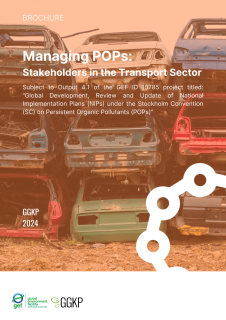
Persistent organic pollutants (POPs), commonly found in plastics and synthetic textiles used in vehicles, pose significant environmental and health risks. These hazardous chemicals persist in ecosystems and can accumulate through the food chain, threatening both human health and biodiversity.
This document highlights the stakeholders in managing POPs and chemicals of concern (CoC) in the transport sector. By identifying stakeholders across all stages of a vehicle’s lifecycle, potential sources of POPs and their periods of use, it contributes to the data collection efforts during POPs inventory development and update, and overall development, review and update of National Implementation Plans (NIPs).
Target audience
- Stockholm Convention Official Contact Points and National Focal Points, particularly from project countries
- National officials and experts involved in the process of reviewing and updating the NIPs
- National officials and experts involved in hazardous chemicals and waste management
- Members of NIP National Coordinating Mechanism/Committees and Project Coordination Units/Thematic Task Groups
- Representatives of regional centres
- Other stakeholders
As part of the GEF-funded and UNEP-led “Global Development, Review and Update of NIPs under the Stockholm Convention on POPs” project, the Green Growth Knowledge Partnership (GGKP) is executing Component 4, focused on disseminating information, managing knowledge and coordinating with the Stockholm Convention Secretariat to provide accessible, integrated tools and resources for all Parties.
